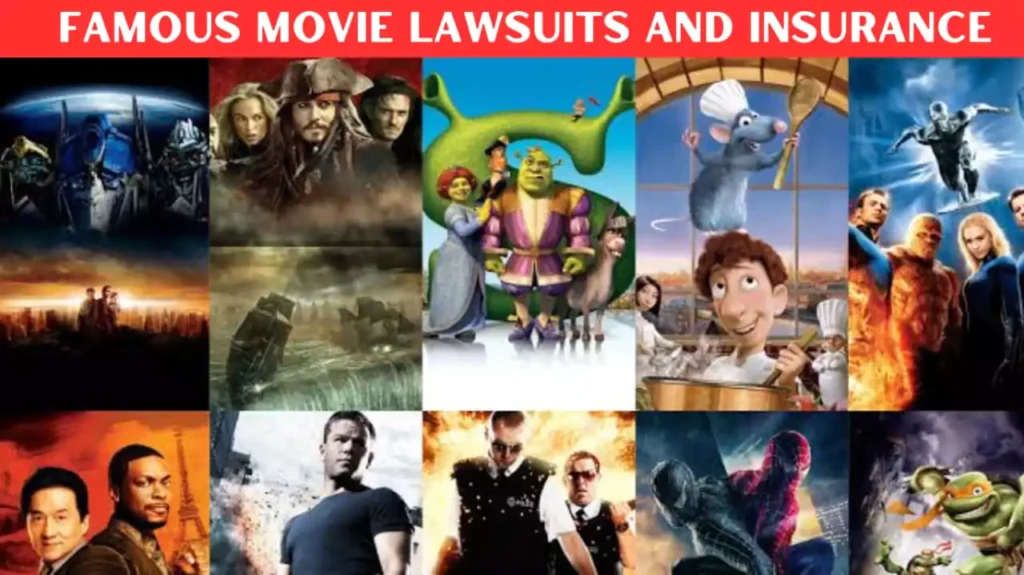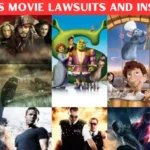Movies are often seen as a form of entertainment, but behind the scenes, the film industry is rife with legal battles, disputes, and insurance claims. These famous lawsuits highlight the complexities of the film world and the crucial role that insurance plays in protecting filmmakers, actors, and production companies. This blog post delves into some of the most notable movie lawsuits, the insurance implications involved, and the lessons we can learn from these cases.
Check out The Trending

The Importance of Insurance in Filmmaking
Before diving into specific lawsuits, it’s essential to understand why insurance is vital in the film industry. Filmmaking involves significant financial investment, with budgets often running into millions of dollars. With such high stakes, the risks of production delays, accidents, and legal disputes are ever-present. Insurance helps mitigate these risks, providing a safety net for filmmakers and ensuring that projects can continue despite unforeseen challenges.
Types of Insurance in Film Production
- General Liability Insurance: Covers bodily injury and property damage that may occur during filming.
- Production Insurance: Protects against loss or damage to the film, including equipment and sets.
- Errors and Omissions Insurance: Essential for protecting against lawsuits related to copyright infringement, defamation, and other claims.
- Workers’ Compensation Insurance: Covers medical expenses and lost wages for crew members injured on the job.
Having comprehensive insurance coverage is not just a good practice; it’s a necessity in an industry where anything can happen.
Case Study: The “Twilight Zone” Tragedy
One of the most notorious incidents in film history involves the tragic events on the set of “The Twilight Zone: The Movie” in 1982. During filming, a helicopter crash resulted in the deaths of actor Vic Morrow and two child actors, Myca Dinh Le and Renee Shin-Yi Chen. The helicopter was piloted by a crew member who lost control during a scene involving pyrotechnics.
Legal Consequences
The tragedy led to multiple lawsuits against the filmmakers, including director John Landis and the production company. The victims’ families claimed negligence, arguing that the crew had ignored safety regulations. In 1986, a jury acquitted Landis and his associates of criminal charges, but the civil suits continued for years.
Insurance Implications
This case illustrates the need for filmmakers to have robust liability insurance. The production company faced significant financial repercussions as the lawsuits unfolded. While the details of the insurance settlements were not publicly disclosed, it’s clear that having proper coverage would have been crucial in addressing the legal claims.
Case Study: “Pirates of the Caribbean” Injuries
Injuries on set are a common occurrence in the film industry, and the “Pirates of the Caribbean” franchise is no exception. During the filming of “Pirates of the Caribbean: Dead Man’s Chest,” actor Johnny Depp sustained injuries while performing a stunt.
Legal Fallout
Depp filed a lawsuit against the production company for unsafe working conditions. Although the lawsuit was eventually settled, it highlighted the importance of ensuring that stunts and special effects are conducted safely.
Role of Insurance
In this case, workers’ compensation insurance would have played a significant role in addressing Depp’s medical expenses and lost wages. Production insurance would also cover any delays caused by the injury. This incident serves as a reminder of the need for comprehensive safety measures and insurance coverage in stunt-heavy films.
Case Study: “The Last House on the Left”
“The Last House on the Left,” directed by Wes Craven, is a horror film that became infamous for its graphic content and controversial themes. After its release, the film faced multiple lawsuits from individuals who felt that the movie was exploitative and damaging.
Legal Issues
In one notable case, a group of parents filed a lawsuit claiming that the film was responsible for their children’s emotional distress. The lawsuit was ultimately dismissed, but it raised questions about the ethical responsibilities of filmmakers and the content they produce.
Insurance Considerations
Errors and omissions insurance is crucial for filmmakers facing claims of defamation or emotional distress. This type of insurance would protect against potential lawsuits arising from the film’s content, covering legal fees and settlement costs.
Case Study: “The Revenant” and Bear Attack
During the production of “The Revenant,” directed by Alejandro González Iñárritu, a bear attack occurred during a scene. Although Leonardo DiCaprio’s character was not directly harmed, the incident raised safety concerns among the cast and crew.
Legal and Safety Implications
While there were no lawsuits stemming directly from this incident, it served as a wake-up call for the industry regarding safety protocols on set. Filmmakers must prioritize the well-being of their cast and crew, especially when dealing with dangerous animals or stunts.
The Role of Insurance
In this scenario, production insurance would be vital in covering any injuries or damages related to accidents. Additionally, liability insurance would protect against claims related to unsafe working conditions.
Case Study: “Brokeback Mountain” and Copyright Claims
“Brokeback Mountain” faced a copyright lawsuit from a writer who claimed that the film’s story closely resembled his unpublished work. The case raised important questions about originality and ownership in the film industry.
Legal Proceedings
The lawsuit brought attention to the issue of intellectual property rights in filmmaking. While the court ultimately ruled in favor of the filmmakers, the case underscored the importance of protecting one’s work.
Insurance Implications
Errors and omissions insurance would have been essential for the filmmakers in this case, covering legal fees associated with copyright claims. This type of insurance is crucial for any production facing potential infringement allegations.
The Role of Legal Counsel in Filmmaking
In addition to insurance, having legal counsel is vital for filmmakers. Legal advisors can help navigate the complex landscape of contracts, copyright issues, and liability concerns. They play a key role in ensuring that productions comply with laws and regulations, minimizing the risk of lawsuits.
Real-World Example
A prime example is Harvey Weinstein and the lawsuits surrounding The Weinstein Company. Numerous lawsuits emerged regarding allegations of sexual misconduct and harassment. Legal teams were instrumental in addressing these claims, although the financial and reputational damage was extensive.
Insurance Needs
In such cases, directors and producers should have directors and officers insurance (D&O) to protect against personal liability claims. This type of insurance helps safeguard individuals in leadership positions from claims related to their actions in managing the company.
Lessons Learned from Famous Lawsuits
- Prioritize Safety: Filmmakers must ensure the safety of their cast and crew. Implementing rigorous safety protocols can help prevent accidents and reduce liability.
- Invest in Comprehensive Insurance: Having the right insurance coverage can protect filmmakers from financial ruin in the event of lawsuits. Understanding the various types of insurance available is essential.
- Understand Legal Obligations: Filmmakers should work closely with legal counsel to navigate contracts and copyright issues, ensuring they are protected against potential claims.
- Maintain Ethical Standards: Consider the ethical implications of the content being produced. Filmmakers should be aware of their responsibilities to audiences and subjects portrayed in their work.
- Stay Informed: The legal landscape is continually evolving. Staying informed about changes in laws and regulations can help filmmakers adapt and protect their interests.
Conclusion: Navigating the Legal Landscape
The film industry is a complex web of creativity, risks, and legal challenges. Famous lawsuits highlight the necessity for filmmakers to prioritize safety, invest in comprehensive insurance, and seek legal counsel. These elements are essential for mitigating risks and ensuring successful productions.
As aspiring filmmakers or industry professionals, understanding these cases and the role of insurance can help navigate the intricate landscape of filmmaking. The lessons learned from these famous lawsuits can serve as a guide to protect against future challenges and foster a safer, more responsible industry.
In the end, while the glitz and glamour of Hollywood may captivate audiences, the realities of filmmaking involve significant responsibility, both legally and ethically. By learning from past mistakes, the industry can strive for a future where creativity thrives alongside safety and accountability.
What are the most common reasons for lawsuits in the film industry?
Common reasons include copyright infringement, personal injury, contract disputes, and defamation.
How can filmmakers protect themselves from lawsuits?
Filmmakers can protect themselves by obtaining comprehensive insurance, working with legal counsel, and adhering to safety protocols.
What is errors and omissions insurance, and why is it important?
Errors and omissions insurance protects filmmakers against claims of negligence or infringement, covering legal fees and settlements related to copyright and defamation issues.
What should filmmakers do if they receive a lawsuit?
They should consult with legal counsel immediately, review their insurance policies, and gather relevant documentation to respond appropriately.
Can independent filmmakers face lawsuits like major studios?
Yes, independent filmmakers can face lawsuits and should take similar precautions, including obtaining proper insurance and legal advice.







Wonderful web site Lots of useful info here Im sending it to a few friends ans additionally sharing in delicious And obviously thanks to your effort
Your blog is a constant source of inspiration for me. Your passion for your subject matter is palpable, and it’s clear that you pour your heart and soul into every post. Keep up the incredible work!
I was recommended this website by my cousin I am not sure whether this post is written by him as nobody else know such detailed about my trouble You are amazing Thanks
Your writing is a true testament to your expertise and dedication to your craft. I’m continually impressed by the depth of your knowledge and the clarity of your explanations. Keep up the phenomenal work!
“Simply extraordinary! ✨ Your in-depth analysis and crystal-clear explanations make this a must-read. The amount of valuable information you’ve packed in here is amazing.”